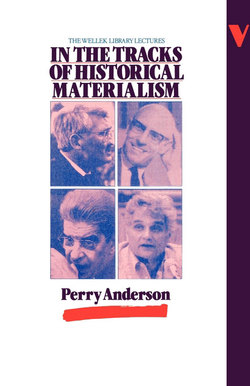Читать книгу In the Tracks of Historical Materialism - Perry Anderson - Страница 7
Foreword
ОглавлениеThe text of this short book needs some explanation. When the Programme in Critical Theory at the University of California at Irvine invited me to give three lectures in a series associated with the Wellek Library, I elected to discuss the contemporary situation of just one such theory. As I had already attempted a sketch in the mid seventies of the evolution of Marxism in Western Europe since the First World War, offering some predictions as to its likely future directions, it seemed opportune to review intellectual developments since then and to look at how my earlier conjectures had fared. The result is not exactly a sequel to Considerations on Western Marxism. This is partly because the period with which it deals is too short — scarcely a decade, in effect. Such an interval does not permit the kind of settled retrospect that half-a-century of history can afford. Proportions and relations are always liable to foreshortening from such a close distance — with consequent distortions. The form of the analyses presented here also differs from that earlier account. Spoken as lectures, in an academic setting, they employ a more informal address than would the ordinary page, one involving more frequent use of the personal pronoun. It seemed artificial to alter this after the event; but it remains a feature to be excused. Another peculiarity of the text, as will be seen, is its initial set at the subject: introduced under the rubric of general remarks on the notion of ‘critical theory’ itself, and its ambiguities.
One other departure from the lines of the previous study may be noted. On this occasion, a survey of recent developments within Marxism was not practicable without some consideration of concurrent philosophical developments outside it, as they affected, or appeared to affect, its fortunes. For this reason, the second lecture is largely devoted to a discussion of French structuralism and post-structuralism. My debts here are two-fold. The general inspiration for my treatment of this field I owe to Sebastiano Timpanaro, whose combination of critical scholarship and political fortitude are an example to every socialist of my generation. For more local reflections I owe very much to Peter Dews. His forthcoming book on the subject, A Critique of French Philosophical Modernism, incomparably wider in scope and finer in grain, is written with an authority and sympathy I do not possess: its appearance will soon render these pages more or less obsolete. They will have served their purpose if they in any way prepare, albeit in a somewhat dissenting register, for his.
To round off the lectures, I have included a postscript that raises a few problems not directly broached in them – issues which concern the relationship between Marxism and socialism, essentially. In all, the book tries to track the movements of historical materialism over the past years, which took more than one direction. The results could of necessity be no more than an interim reading. As such, they are intended simply to provide a rough guide to some of the changes in the intellectual environment as the seventies passed into the eighties. I am pleased that they appear under a series linked to the name of René Wellek, a doyen of comparative literature and master of the history of criticism itself. His easy internationalism of mind, and committed defence of classical standards of rational argument and appraisal, should command the admiration of anyone attached to the values of Marxism – a body of thought far from his own. At all events, they do mine. At the end of Discriminations, Wellek offered his readers ‘A Map of Contemporary Criticism in Europe’. Something like that, for historical materialism in North America and Western Europe, is attempted here. I would like to thank especially Frank and Melissa Lentricchia, Mark Poster and Jon Wiener for the opportunity to make the attempt; and for the warmth of their hospitality at Irvine.
